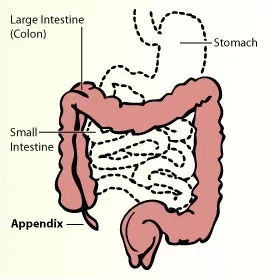Appendicitis (Pediatric)

Appendicitis is inflammation or infection of the appendix, and if left untreated, can cause rupture (or perforation) of the appendix. The appendix is a small finger shaped pouch attached to the large intestine and is usually found on the lower right side of the abdomen. The appendix has no known purpose or function.
What causes appendicitis?
Appendicitis is thought to occur when bacteria become trapped within the appendix. This happens if the opening of the appendix becomes blocked, and the contents of the appendix become trapped. Blockage of the appendix may be caused by a hard ball of stool or by compression from a large lymph node. Trapped bacteria can cause inflammation and irritation of the appendix and, if left untreated, can lead to infection, or appendicitis. Once the appendix becomes infected it can rupture (perforate). This is called perforated appendicitis. With either type of appendicitis, children might have symptoms of abdominal pain, fever, nausea, vomiting, or a poor appetite. Unfortunately, there is no way to predict who will get appendicitis and when it will occur.
How is appendicitis diagnosed?
The diagnosis of appendicitis is made based on the child's symptoms and the doctor's examination. The examination usually includes an ultrasound study. At UCSF, if appendicitis is not diagnosed with ultrasound, we offer a special radiology study called MRI to evaluate for appendicitis. This study has the advantage of no radiation and can safely be done in children.
How is appendicitis treated?
Appendicitis (not ruptured)
When appendicitis is diagnosed your child will be admitted to the hospital for intravenous (by vein) fluids, intravenous antibiotics and an appendectomy (an operation to remove the appendix). This operation can be safely done using laparoscopy (the use of small telescopes and instruments) and is the method of choice for removing the appendix in children.
Ruptured Appendicitis
If your child has a ruptured appendix, he or she will be admitted to the hospital to receive intravenous antibiotics. Surgery is necessary but does not need to be done immediately. However, treatment with antibiotics is very important and must be done right away. Getting the infection under control before the operation is very important for your child's health. After antibiotic treatment is begun the surgeon may perform an appendectomy or may wait until the infection is healed. The waiting time can vary from days to weeks.
Ruptured appendicitis can cause two complications (problems) that require treatment, 1) a wound infection (infection of the cut where the operation was done) and 2) an abscess (a collection of pus in the abdomen). If the wound becomes infected it may need to be cleaned, under general anesthesia, in the operating room. After this cleaning the nurses and doctors will keep it covered with moist gauze. You will be taught to care for the wound when your child goes home.
If an abscess forms, it may require a drain to be placed to expel the infected fluid. Drainage can be done by either the pediatric surgeon, in the operating room, or by the interventional radiologist, in the radiology center. An interventional radiologist is a doctor who does specialized procedures with the help of x-ray studies. Both specialists require a child to be placed under general anesthesia to drain the abscess.
In most appendectomy operations, there is very little blood loss. You child will receive blood only in the rare case of an extreme emergency.
How long will my child be in the hospital?
Appendicitis (not ruptured)
Children with appendicitis usually stay in the hospital 1-2 days after the operation. Children are discharged when they >are able to drink, are comfortable on pain medication by mouth, and do not have a fever. Children usually only need to take Tylenol or ibuprofen for pain after surgery.
Ruptured Appendicitis
Children with a ruptured appendix usually need to stay in the hospital for several days while receiving antibiotics. Before going home, a child must be able to drink and eat, stay comfortable on pain medication by mouth, and be without a fever. These are all signs the infection has healed. Children usually only need to take Tylenol or ibuprofen for pain after surgery.
Interval Appendectomy
Treating with antibiotics and delaying the operation until the appendix has healed is called an interval appendectomy. The operation is scheduled six to eight weeks after infection has resolved. Every case of appendicitis is different and the needs of each child varies. Your child's pediatric surgeon will talk with you about the best treatment for your child.
What is expected after surgery?
After appendectomy, your child has a small risk of developing an infection, either at the skin incision sites or deep abscess (pocket of infection) in the abdomen. If your child develops symptoms that include fever, nausea, abdominal pain, please call the pediatric surgery office for evaluation.
In addition, after any abdominal operation, your child may develop scar tissue on the inside, that can lead to risk of bowel blockage or obstruction from the scar tissue or adhesions. This can occur at any time in your child's life. If your child develops vomiting or abdominal pain, he or she will need to be seen by doctor immediately for evaluation. In many of the cases, bowel obstruction requires hospital admission, but does resolve spontaneously with bowel rest and intravenous fluid hydration. A small percentage of patients will need additional operation to cut the scar tissue and release the intestine from the blockage.
